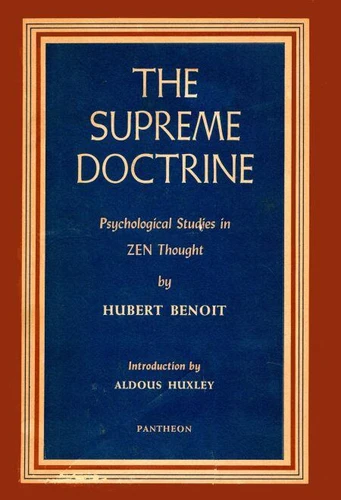The Supreme Doctrine. Psychological Studies in Zen Thought
Par :Formats :
Disponible dans votre compte client Decitre ou Furet du Nord dès validation de votre commande. Le format ePub protégé est :
- Compatible avec une lecture sur My Vivlio (smartphone, tablette, ordinateur)
- Compatible avec une lecture sur liseuses Vivlio
- Pour les liseuses autres que Vivlio, vous devez utiliser le logiciel Adobe Digital Edition. Non compatible avec la lecture sur les liseuses Kindle, Remarkable et Sony
- Non compatible avec un achat hors France métropolitaine
 , qui est-ce ?
, qui est-ce ?Notre partenaire de plateforme de lecture numérique où vous retrouverez l'ensemble de vos ebooks gratuitement
Pour en savoir plus sur nos ebooks, consultez notre aide en ligne ici
- Nombre de pages256
- FormatePub
- ISBN978-0-307-83195-8
- EAN9780307831958
- Date de parution21/08/2013
- Protection num.Adobe DRM
- Taille2 Mo
- Infos supplémentairesepub
- ÉditeurPantheon
Résumé
(With an Introduction by Aldous Huxley) In its Eastern aspects-Chinese, Hindu, and Japanese-Zen Buddhism has proved a puzzle, although a stimulating one, to the Western mind. Himself a Westerner, Dr. Benoit has approached it through an occidental manner of thinking. "For the first time, Dr. Benoit presents the traditional doctrine of Zen Buddhism in a language that is understandable to the Western world, " says one of his Indian admirers, Swami Siddheswarananda. The author does not advocate a "conversion" to Eastern religion and philosophy.
Rather, he would have Western psychological thinking and reasoning meet with oriental wisdom on an intellectual plane, in order to make it participate in the oriental understanding of the state of man in general. "I do not need to burn the Gospels in order to read Hui-neng, " says Dr. Benoit. Zen, to be quite exact, is not so much a doctrine as a hygiene of intelligent living. As such it is presented by the author, a practicing psychoanalyst.
It is a way of breaking the deadlock into which the faulty functioning of our civilization has led us, of liberating us from the prevalent contemporary sickness, anxiety. This book provides the elements for reaching "satori, " that modification of the internal functioning of man which can be described as a state of unassailable serenity. This state, Dr. Benoit makes clear, is he truly "normal" one.
How to develop intelligence and will so that this transformation of life can be achieved is the subject of this book.
Rather, he would have Western psychological thinking and reasoning meet with oriental wisdom on an intellectual plane, in order to make it participate in the oriental understanding of the state of man in general. "I do not need to burn the Gospels in order to read Hui-neng, " says Dr. Benoit. Zen, to be quite exact, is not so much a doctrine as a hygiene of intelligent living. As such it is presented by the author, a practicing psychoanalyst.
It is a way of breaking the deadlock into which the faulty functioning of our civilization has led us, of liberating us from the prevalent contemporary sickness, anxiety. This book provides the elements for reaching "satori, " that modification of the internal functioning of man which can be described as a state of unassailable serenity. This state, Dr. Benoit makes clear, is he truly "normal" one.
How to develop intelligence and will so that this transformation of life can be achieved is the subject of this book.
(With an Introduction by Aldous Huxley) In its Eastern aspects-Chinese, Hindu, and Japanese-Zen Buddhism has proved a puzzle, although a stimulating one, to the Western mind. Himself a Westerner, Dr. Benoit has approached it through an occidental manner of thinking. "For the first time, Dr. Benoit presents the traditional doctrine of Zen Buddhism in a language that is understandable to the Western world, " says one of his Indian admirers, Swami Siddheswarananda. The author does not advocate a "conversion" to Eastern religion and philosophy.
Rather, he would have Western psychological thinking and reasoning meet with oriental wisdom on an intellectual plane, in order to make it participate in the oriental understanding of the state of man in general. "I do not need to burn the Gospels in order to read Hui-neng, " says Dr. Benoit. Zen, to be quite exact, is not so much a doctrine as a hygiene of intelligent living. As such it is presented by the author, a practicing psychoanalyst.
It is a way of breaking the deadlock into which the faulty functioning of our civilization has led us, of liberating us from the prevalent contemporary sickness, anxiety. This book provides the elements for reaching "satori, " that modification of the internal functioning of man which can be described as a state of unassailable serenity. This state, Dr. Benoit makes clear, is he truly "normal" one.
How to develop intelligence and will so that this transformation of life can be achieved is the subject of this book.
Rather, he would have Western psychological thinking and reasoning meet with oriental wisdom on an intellectual plane, in order to make it participate in the oriental understanding of the state of man in general. "I do not need to burn the Gospels in order to read Hui-neng, " says Dr. Benoit. Zen, to be quite exact, is not so much a doctrine as a hygiene of intelligent living. As such it is presented by the author, a practicing psychoanalyst.
It is a way of breaking the deadlock into which the faulty functioning of our civilization has led us, of liberating us from the prevalent contemporary sickness, anxiety. This book provides the elements for reaching "satori, " that modification of the internal functioning of man which can be described as a state of unassailable serenity. This state, Dr. Benoit makes clear, is he truly "normal" one.
How to develop intelligence and will so that this transformation of life can be achieved is the subject of this book.



